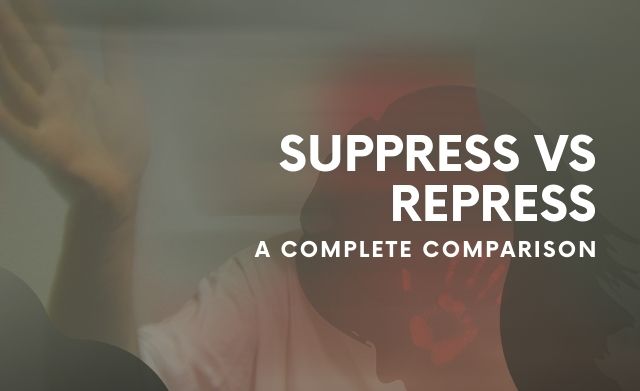
Every language has so many identical words often used interchangeably. As two individual English words, the difference between suppress and repress is very subtle, but the meaning fluctuates based on separate fields and actions.
To use any word in the perfect place requires clarification. We just cannot use humor instead of rumor or bear instead of bare. When two words that sound similar or have similar meanings, they need to be used carefully. But, suppress and repress raises more difficulty, as they both sound pretty identical and have almost the same meanings.
Suppress and repress both are verbs; the noun of suppress is suppression, and the noun form of repress is repression.
To suppress a thing means to end or inhibit or restraint forcibly from being revealed or developed. On the other hand, to repress something means to hold back something or to keep something under control forcibly.
Sounds pretty confusing, right? Having that in mind, this ongoing post aims to manifest the difference between these two confusing words from different standpoints.
Table of Contents
Comparison chart
| Difference | Suppress | Repress |
| Definition | To put an end to something forcefully. | To hold back or subdue feeling, desire, or any emotion either forcibly or unconsciously. |
| Word origin | Latin word Supprimere meaning press down. | Latin word reprimere meaning keep back something objectionable. |
| Example | The government successfully suppressed the rebels. | His repressed memories as a child later caused difficulty to form a relationship. |
| Meaning in psychology | In psychology, suppression means to inhibit or stop desires, emotions, feelings, thoughts, impulses consciously. | In psychology, repression means to subdue desires, emotions, unwanted thoughts, impulses unconsciously. |
| As defense mechanisms | As a defense mechanism, suppression has some positive outcomes. | As a defense mechanism, repression causes negative effects and personality disorders. |
| Meaning in politics | In politics, to suppress something means to stop or eradicate something by force. | In politics, to repress something means to subdue or push a revolt or other crisis by force. |
Suppress definition
According to the Cambridge dictionary, the meaning of suppress is to end something or prevent something from being expressed by force.
The Merriam-webster dictionary shows suppression as an action to press down or to put down by force or authority.
The word Suppress is a transitive verb. The noun form of suppress is suppression, the adjective form is suppressive, and the adverb of suppress is suppressively. The past tense of suppress is suppressed, and the present participle is suppressing.
In psychology, to suppress means to hold back or inhibit emotions, desires, thoughts, expressions, impulses consciously.
So, when we say to suppress something, it generally means putting an end to something or inhibiting something forcefully. Such as, the government successfully suppressed the insurgents, or the girl suppressed her anger.
Suppress word origin
The word Suppress came from the Latin word Supprimere. Supprimere is a verb and consists of two different words sub and premere. Sub means down, and the word premiere means to press. So the word supprimere means to press down.
Repress definition
According to the Cambridge dictionary, repress’s meaning is to disallow or to prevent something, especially desires, thoughts, or feelings, from being expressed.
The Merriam-webster shows repression as an action to hold in something by self-control.
The word repress is also a transitive verb. The noun form of repress is repression, the adjective is repressive, and the adverb form of repress. The past tense of repress is repressed, while the present participle of repress is repression.
In psychology, to repress means to hold back or subdue emotions, desires, thoughts, expressions, feelings, impulses subconsciously.
So, from a general perspective, when we say to repress something, it means that we hold back or subdue a feeling, desire, or any emotion either forcibly or unconsciously. For example, antidepressant drugs could repress someone’s sexual desire. Or, Chloe’s repressed emotions led to harm to her mental health.
Repress word origin
The word Repress came from the Latin word reprimere. Reprimere is a verb and consists of two different words re and premere. Re means back, and the word premiere means to press. So, accordingly, the word reprimere means to press/keep/push back something (objectionable).
Suppress vs repress in psychology
In psychology, suppression is consciously inhibiting emotions, impulses, feelings, or any expression. Suppression is a psychological mechanism that is considered useful. In our daily social lives, we control our emotions, resist indulging thoughts that are not deemed politically or socially appropriate based on situations but remain aware of them. When we forcefully restrain or avoid expressing our impulses, we are suppressing something, according to psychology.
On the other hand, repression refers to any subconscious act of not responding to one’s desire, feeling, impulses. In psychology, repression is also known as dis-associative amnesia. An individual might repress impulses to become unconscious about past traumatic or bad memories.
Freud classified repression into two stages: Primary repression and repression proper. Primary repression refers to processes of hiding impulses or feeling before they reach the level of consciousness. Primary repression entirely occurs unconsciously. On the other hand, repression proper occurs when a human being becomes aware of his repressed impulses and intentionally removes them from the conscious mind.
We tend to forget our past bad memories, such as childhood abuse, insults, negligence, intense pain, etc. But, we struggle to forget them. Psychology says we have that one mechanism unconsciously acting against those past traumatic memories. That is repression; we repress our many bad pasts by subduing them in our subconscious mind.
Freud viewed the mind much like an iceberg, only a smaller part of the entire iceberg we see from outside, where the large part lies beneath the water’s surface. The conscious mind of a human mind can be exemplified as the tip of an iceberg. Conversely, the subconscious mind is like the enormous part that is sinking beneath the water surface.
According to Sigmund Freud, suppression is a volitional part of repression. Suppression generally has more positive results compared to repression. This defense mechanism of our mind consciously pushes anxiety-provoking and unwanted thoughts, fantasies, bad memories.
The concept of repression is a part of psychoanalytic theory that was developed by Sigmund Freud. However, Freud didn’t classify repression as a part of defense mechanisms. He claimed, this process occurs in a human even before the ego develops.
Repression is a process that subdues our unwanted feelings, which affects our future behaviors, personality, causes anxiety, and mental disorders. For example, if a particular young-adult was abused or assaulted by his parents in his childhood and repressed those memories. Later, she/he might struggle to form a relationship.
Suppression and repression: Defense mechanisms
Defense mechanisms are a number of behaviors that a person uses to avoid unpleasant events, thoughts, and actions. This concept was developed in psychoanalytic theory by Sigmund Freud. Defense mechanisms are normal behaviors that develop in a person naturally.
Several defense mechanisms are discovered to dates, such as denial, suppression and repression, regression, sublimation, regression, intellectualization, projection, and many more.
In 1892, Sigmund Freud proposed suppression as a voluntary part of repression. Suppression is the type of defense mechanism by which individuals cope with unpleasant, distressing, unwanted mental materials. For example, an employee has anger for his boss, but he/she suppresses them inside in order to save the job. Or to avoid an unpleasant situation, we often choose comparative polite words, but inside intense words wander crazy.
On the other hand, the area of repression as a defense mechanism is more mysterious. What we hide inside consciously can be determined, but what occurred in us subconsciously, hard to point out.
Repression is a type of psychological mechanism; we often confuse it with suppression. But there are differences. Repression is more than avoiding something only.
It is also believed that our unconscious desires cause phobias or other psychological disorders as well, and they are mostly influenced by repressive impulses that we subdue.
The key differences between Suppress and Repress
- Generally, to suppress something means to inhibit or to end something(impulses, emotions, revolt forcefully). On the other hand, to repress something means to subdue or hold back something either forcefully.
- The word Suppress came from the Latin word suppremiere, meaning press down, and Repress came from the Latin word reprimere, meaning press/keep/hold back something.
- In psychology, Suppression means to hold back or inhibit an emotion, impulse, thought consciously. When we unconsciously subdue our impulses inside, we repress them.
- As a defense mechanism, suppression has positive outcomes, such as we sometimes suppress unwanted thoughts to achieve our major goal. Repression often brings negative effects in a person’s future behaviors or personality. Such as repression often creates phobia or harms future mental health.
- According to Sigmund Freud, suppression can be compared to the tip of an iceberg, and repression can be compared to the part of an iceberg that lies beneath the water surface.
Frequently asked questions (FAQs):
What Are Repressed Emotions?
Repressed emotions are those emotions that we avoid unconsciously.
Is it bad to repress emotions?
Psychology says repressed emotions might cause anxiety, stress, personality disorders, or even phobias.
What are the 10 defense mechanisms?
There are several defense mechanisms that a person uses consciously or unconsciously. Some are denial, projection, suppression, repression, intellectualization, sublimation, rationalization, regression, sublimation, displacement, etc.
What is an example of repression?
An example of repression: Chole’s childhood repressed memory of a bike accident created phobia in her as a young adult.
What happens when feelings are suppressed?
Compared to repression, suppression has some positive outcomes. Suppression helps to cope with society or to achieve a specific goal. However, Any emotion that is suppressed or repressed might cause stress and anxiety in the future.
Conclusion
When two different words or topics create confusion in our minds, we need to clarify them in order to use them in the right place. Suppress and repress are two words that sound similar and even almost have the same meaning. However, based on different areas like psychology, the meaning amplifies. Here in this article, we have tried to discuss the difference between suppress and repress from different perceptions.

Craig is a full-time academic and research-based article writer from California. A trained content creator who started his career as a column writer for local magazines and newspapers. His works have been published on many renowned online platforms.
